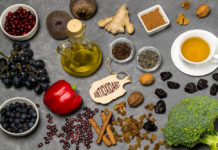What Causes a Sore Throat?
According to the Mayo Clinic, viruses cause most sore throats, including the following:
- Common cold
- Flu
- Mononucleosis (informally known as mono)
- Measles
- Chickenpox
While less often than viruses, bacterial infections can also cause sore throats. The most common is Streptococcus pyogenes, which is more generally known as strep throat.
Beyond viral and bacterial infections, a sore throat may be caused by various allergies, air dryness, in and outdoor pollutants, and gastroesophageal reflux disease (GERD).
But despite the cause of a sore throat, they are nonetheless pesky, irritating, and sometimes downright, well, sore. Luckily, there are numerous treatment options to manage the pain, including medications to fight the infection itself, along with these home remedies for sore throat relief.
7 Sore Throat Remedies
1. R&R
First and foremost, and especially if a sore throat is caused by an underlying infection, allow yourself some rest and recovery (R&R) for rapid recovery.
And not only does staying at home and in bed save your desk mates from catching it, but grants you the time for a little (or a lot of) of rest.
2. Bask in Quietness
With yelling a culprit of vocal cord strain, rest your voice just as you would a sore or overworked muscle. (Especially if your sore throat stemmed from that concert last night…)
And while you might naturally whisper to spare your voice box, doing so might actually make matters worse. In fact, whispering can be as bad for your voice as shouting! So if you want to be heard, try talking at a lower volume than usual or better yet, perhaps get that writing pen and paper ready…
3. Avoid Irritants
There are a number of irritants that can not only exacerbate the pain, but cause sore throat. Try to avoid the following common irritants:
- Smoke
Smoking and secondhand smoke can irritate the throat, along with increasing the risk of cancers of the mouth, throat, and voice box.
- Spicy Foods
With GERD a common cause of a sore throat, it is important to stray away from spicy foods that may aggravate it. Other management techniques for GERD include avoiding fried and citrus foods and staying upright for at least an hour after meals.
- Allergens
Seasonal or ongoing allergies to allergens such as pollen, indoor molds, pet dander, or dust mites increases the likelihood of developing a sore throat. Furthermore, sinus drainage may irritate the throat and even spread the infection.
4. Drink Fluids
While swallowing fluids might seem seem painful on a sore throat, drinking them is extremely important, especially as fluid needs increase in conjunction with a fever.
Fluids also keep the throat moist and prevent dehydration. Also avoid caffeine and alcohol, which can be irritating on the throat and result to water loss.
Beyond water, fluid sources include:
- Chamomile Tea
Naturally soothing and used for medicinal purposes for decades (if not centuries), chamomile tea can help ease a sore throat. Adding honey can also help suppress a pesky cough and soothe pain.
- Broths
Broths and soups supply valuable electrolytes, simultaneously replacing both salt and water that may be lost with a fever.
- Popsicles
Perhaps one of the most (and best) memorable part of a sore throat as a kid was getting that popsicle! (Just be sure to avoid citrusy flavors if GERD is a trigger…)
5. Gargle with Saltwater
A saltwater gargle is one of the most common home remedies for a sore throat, particularly by providing symptomatic relief and offering preventative benefits.
WebMD reports gargling works by “creating a high-salt barrier and you’re pulling out a lot of fluids from the tissues in the throat area, so you’re washing the virus out. The salt functions as a magnet for water. It’s good for symptomatic relief. And you end up swallowing some of it, so it’s sort of helping you with dehydration as well.”
And we will cheers our saltwater to that! (But just don’t drink it…)
How to Do It:
Mix a ¼ or ½ teaspoon of table salt with 4 or 8 ounces of warm water, respectively. Gargle the solution and then spit it out. Repeat the gargling process a few times each day.
6. Humidify the Air
Since dry air can instigate or worsen a sore throat, using a humidifier can help moisten the air and offer relief from a sore throat and reduce swollen tissue in the throat and nasal cavities.
Don’t have a humidifier available? Sit in a steamy bathroom for a few minutes!
7. Consider Herbal Supplements
There are a wide variety of herbal supplements that may help soothe a sore throat, including slippery elm, licorice root, and marshmallow root.
However, it is commonly advised to seek out professional guidance before trying out any sort of alternative treatment. Doing so helps ensure the upmost safety, particularly related to potential side effects and medication interactions, along with proper dosing recommendations. And especially if managing an underlying infection, you should not solely rely on complementary treatments.









